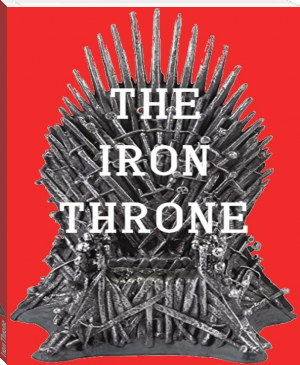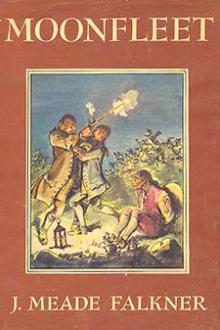Iron Throne, Ellen Gould-Harmon [rm book recommendations txt] 📗

- Author: Ellen Gould-Harmon
Book online «Iron Throne, Ellen Gould-Harmon [rm book recommendations txt] 📗». Author Ellen Gould-Harmon
The books of record in heaven, in which the names and the deeds of men are registered, are to determine the decisions of the judgment. Says the prophet Daniel: "The judgment was set, and the books were opened." The Revelator, describing the same scene, adds: "Another book was opened, which is the book of life: and the dead were judged out of those things which were written in the books, according to their works." Revelation 20:12. The book of life contains the names of all who have ever entered the service of God. Jesus bade His disciples: "Rejoice, because your names are written in heaven." Luke 10:20. Paul speaks of his faithful fellow workers, "whose names are in the book of life." Philippians 4:3. Daniel, looking down to "a time of trouble, such as never was," declares that God's people shall be delivered, "everyone that shall be found written in the book." And the Revelator says that those only shall enter the city of God whose names "are written in the Lamb's book of life." Daniel 12:1; Revelation 21:27.
"A book of remembrance" is written before God, in which are recorded the good deeds of "them that feared the Lord, and that thought upon His name." Malachi 3:16. Their words of faith, their acts of love, are registered in heaven. Nehemiah refers to this when he says: "Remember me, O my God, . . . and wipe not out my good deeds that I have done for the house of my God." Nehemiah 13:14. In the book of God's remembrance every deed of righteousness is immortalized. There every temptation resisted, every evil overcome, every word of tender pity expressed, is faithfully chronicled. And every act of sacrifice, every suffering and sorrow endured for Christ's sake, is recorded. Says the psalmist: "Thou tellest my wanderings: put Thou my tears into Thy bottle: are they not in Thy book?" Psalm 56:8.
There is a record also of the sins of men. "For God shall bring every work into judgment, with every secret thing, whether it be good, or whether it be evil." Every idle word that men shall speak, they shall give account thereof in the day of judgment." Says the Saviour: "By thy words thou shalt be justified, and by thy words thou shalt be condemned." Ecclesiastes 12:14; Matthew 12:36, 37. The secret purposes and motives appear in the unerring register; for God "will bring to light the hidden things of darkness, and will make manifest the counsels of the hearts." I Corinthians 4:5. "Behold, it is written before Me, . . . your iniquities, and the iniquities of your fathers together, saith the Lord." Isaiah 65:6, 7.
Every man's work passes in review before God and is registered for faithfulness or unfaithfulness. Opposite each name in the books of heaven is entered with terrible exactness every wrong word, every selfish act, every unfulfilled duty, and every secret sin, with every artful dissembling. Heaven-sent warnings or reproofs neglected, wasted moments, unimproved opportunities, the influence exerted for good or for evil, with its far-reaching results, all are chronicled by the recording angel. The law of God is the standard by which the characters and the lives of men will be tested in the judgment. Says the wise man: "Fear God, and keep His commandments: for this is the whole duty of man. For God shall bring every work into judgment." Ecclesiastes 12:13, 14. The apostle James admonishes his brethren: "So speak ye, and so do, as they that shall be judged by the law of liberty." James 2:12
Those who in the judgment are "accounted worthy" will have a part in the resurrection of the just. Jesus said: "They which shall be accounted worthy to obtain that world, and the resurrection from the dead, . . . are equal unto the angels; and are the children of God, being the children of the resurrection." Luke 20:35, 36. And again He declares that "they that have done good" shall come forth "unto the resurrection of life." John 5:29. The righteous dead will not be raised until after the judgment at which they are accounted worthy of "the resurrection of life." Hence they will not be present in person at the tribunal when their records are examined and their cases decided.
Jesus will appear as their advocate, to plead in their behalf before God. "If any man sin, we have an advocate with the Father, Jesus Christ the righteous." I John 2:1. "For Christ is not entered into the holy places made with hands, which are the figures of the true; but into heaven itself, now to appear in the presence of God for us." "Wherefore He is able also to save them to the uttermost that come unto God by Him, seeing He ever liveth to make intercession for them." Hebrews 9:24; 7:25. As the books of record are opened in the judgment, the lives of all who have believed on Jesus come in review before God.
Beginning with those who first lived upon the earth, our Advocate presents the cases of each successive generation, and closes with the living. Every name is mentioned, every case closely investigated. Names are accepted, names rejected. When any have sins remaining upon the books of record, unrepented of and unforgiven, their names will be blotted out of the book of life, and the record of their good deeds will be erased from the book of God's remembrance. The Lord declared to Moses: "Whosoever hath sinned against Me, him will I blot out of My book." Exodus 32:33. And says the prophet Ezekiel: "When the righteous turneth away from his righteousness, and committeth iniquity, . . . all his righteousness that he hath done shall not be mentioned." Ezekiel 18:24.
All who have truly repented of sin, and by faith claimed the blood of Christ as their atoning sacrifice, have had pardon entered against their names in the books of heaven; as they have become partakers of the righteousness of Christ, and their characters are found to be in harmony with the law of God, their sins will be blotted out, and they themselves will be accounted worthy of eternal life. The Lord declares, by the prophet Isaiah: "I, even I, am He that blotteth out thy transgressions for Mine own sake, and will not remember thy sins." Isaiah 43:25. Said Jesus: "He that overcometh, the same shall be clothed in white raiment; and I will not blot out his name out of the book of life, but I will confess his name before My Father, and before His angels." "Whosoever therefore shall confess Me before men, him will I confess also before My Father which is in heaven. But whosoever shall deny Me before men, him will I also deny before My Father which is in heaven." Revelation 3:5; Matthew 10:32, 33.
The deepest interest manifested among men in the decisions of earthly tribunals but faintly represents the interest evinced in the heavenly courts when the names entered in the book of life come up in review before the Judge of all the earth. The divine Intercessor presents the plea that all who have overcome through faith in His blood be forgiven their transgressions, that they be restored to their Eden home, and crowned as joint heirs with Himself to "the first dominion." Micah 4:8. Satan in his efforts to deceive and tempt our race had thought to frustrate the divine plan in man's creation; but Christ now asks that this plan be carried into effect as if man had never fallen. He asks for His people not only pardon and justification, full and complete, but a share in His glory and a seat upon His throne.
While Jesus is pleading for the subjects of His grace, Satan accuses them before God as transgressors. The great deceiver has sought to lead them into scepticism, to cause them to lose confidence in God, to separate themselves from His love, and to break His law. Now he points to the record of their lives, to the defects of character, the unlikeness to Christ, which has dishonoured their Redeemer, to all the sins that he has tempted them to commit, and because of these he claims them as his subjects.
Jesus does not excuse their sins, but shows their penitence and faith, and, claiming for them forgiveness, He lifts His wounded hands before the Father and the holy angels, saying: I know them by name. I have graven them on the palms of My hands. "The sacrifices of God are a broken spirit: a broken and a contrite heart, O God, Thou wilt not despise." Psalm 51:17. And to the accuser of His people He declares: "The Lord rebuke thee, O Satan; even the Lord that hath chosen Jerusalem rebuke thee: is not this a brand plucked out of the fire?" Zechariah 3:2. Christ will clothe His faithful ones with His own righteousness, that He may present them to His Father "a glorious church, not having spot, or wrinkle, or any such thing." Ephesians 5:27. Their names stand enrolled in the book of life, and concerning them it is written: "They shall walk with Me in white: for they are worthy." Revelation 3:4.
Thus will be realized the complete fulfillment of the new-covenant promise: "I will forgive their iniquity, and I will remember their sin no more." "In those days, and in that time, saith the Lord, the iniquity of Israel shall be sought for, and there shall be none; and the sins of Judah, and they shall not be found." Jeremiah 31:34; 50:20. "In that day shall the branch of the Lord be beautiful and glorious, and the fruit of the earth shall be excellent and comely for them that are escaped of Israel. And it shall come to pass, that he that is left in Zion, and he that remaineth in Jerusalem, shall be called holy, even everyone that is written among the living in Jerusalem." Isaiah 4:2, 3.
The work of the investigative judgment and the blotting out of sins is to be accomplished before the second advent of the Lord. Since the dead are to be judged out of the things written in the books, it is impossible that the sins of men should be blotted out until after the judgment at which their cases are to be investigated. But the apostle Peter distinctly states that the sins of believers will be blotted out "when the times of refreshing shall come from the presence of the Lord; and He shall send Jesus Christ." Acts 3:19, 20. When the investigative judgment closes, Christ will come, and His reward will be with Him to give to every man as his work shall be.
In the typical service the high priest, having made the atonement for Israel, came forth and blessed the congregation. So Christ, at the close of His work as mediator, will appear, "without sin unto salvation" (Hebrews 9:28), to bless His waiting people with eternal life. As the priest, in removing the sins from the sanctuary, confessed them upon the head of the scapegoat, so Christ will place all these sins upon Satan, the originator and instigator of sin. The scapegoat, bearing the sins of Israel, was sent away "unto a land not inhabited" (Leviticus 16:22); so Satan, bearing the guilt of all the sins which he has caused God's people to commit, will be for a thousand years confined to the earth, which will then be desolate, without inhabitant, and he will at last suffer the full penalty of sin in the fires that shall destroy all the wicked. Thus the great plan of redemption will reach its accomplishment in the final eradication of sin and the deliverance of all who have been willing to renounce evil.
At the time appointed for the judgment--the close of the 2300 days, in 1844--began the work of investigation and blotting out of sins. All who have ever taken upon themselves the name of Christ must pass its searching scrutiny. Both the living and the dead are to be judged "out of those things which were written in the books, according to their works." Sins that have not been repented of and forsaken will not be pardoned and blotted out of the books of record, but will stand to witness against the sinner in the day of God. He may have committed his evil





Comments (0)